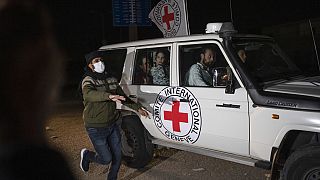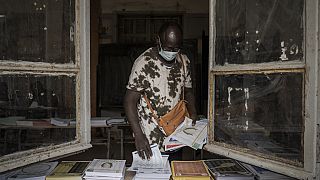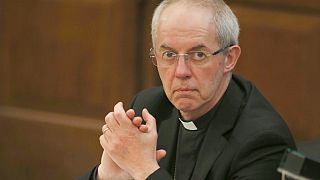United Kingdom
With the rising tide creeping above their waists, soaking the children they hugged tight, around a dozen Kurds refused to leave the cold waters of the English Channel.
It was a futile attempt to delay the inevitable. French police had just foiled their latest attempt to reach the United Kingdom by boat.
The men, women and children were trapped again on the last frontier of their journey from Iraq and Iran. They had hoped that a rubber dinghy would get them to better lives with housing, schooling and work.
Now it disappeared on the horizon, only a few of its passengers aboard.
Police in the quiet northern French town of Ambleteuse, pleaded with them to leave the freezing water.
“The boat is go. It’s over,“ shouted an increasingly irritated officer.
Finally, the asylum-seekers give up and come ashore. Defeated for the moment, but with no doubt that they will try again.
They know they will not find haven in France or elsewhere in the European Union. Europe’s increasingly strict asylum rules, growing xenophobia, and the hostile treatment of migrants is pushing them north.
While the British government has been hostile too, many migrants have family or friends in the UK and a perception they will have more opportunities there.
“The violence is occurring increasing close to shore because people are rushing to escape law enforcement. They are not inflating the boats properly, they are overcrowding them to try and leave as soon as possible,” said Salomé Bahri, a coordinator with the organisation Utopia 56, which helps migrants stranded in France.
In recent months, the normally quiet beaches in north-western France have been disturbed by cat-and-mouse games and sometimes violent clashes between the police and smugglers.
EU rules stipulate that a person must apply for asylum in the first member state they land in, overwhelming countries on the edge of the 27-nation bloc.
“Some have been rejected by several European countries. They know very well that in France with the Dublin Regulation, they won’t be able to apply for asylum. So, it’s their last hope, they don’t have a choice but to go to England,” said Bahri.
While boat crossings across the Channel represent only a tiny fraction of migration to the UK, France last year agreed to prevent migrants from crossing to England in exchange for hundreds of millions of euros.
But, while many have been stopped by police, they are not offered alternative solutions, leaving them in a sort of no-man’s land, which leaves them with no alternative but to try crossing again.
About 10,500 people have reached England in small boats in the first five months of the year, some 37 per cent more than the same time period last year, according to data published by the Britain's Home Office.
The heightened border surveillance is increasing risks and ultimately leading to more deaths. At least 20 people have died so far this year trying to reach England, said Bahri.
That is nearly as many as died in all of last year, according to statistics published by the International Organization of Migration.
Sitting around a fire in an abandoned warehouse-turned-migrant camp in Calais, Mohammed Osman contemplated his limited options.
The 25-year-old Sudanese man was studying medicine in Moscow when the civil war broke out in his home country a year ago.
Forced to flee the fighting, his family could no longer afford to pay for his university fees and Osman was forced to leave Russia, where his visa only allowed him to study, not work.
He crossed to Belarus and then to Poland, before eventually making it to Germany where he tried to apply for asylum, but was ordered to return to Poland, as per EU rules.
All he wants now is to finish his medical studies in the UK, a country whose language he, like many other Sudanese people, already speaks.
“I am a good person. I know that I can be a good doctor or anything. So what is the problem,” he said.
“If I stay here or another place, maybe I’m going to stay all my life like that. Maybe they destroy it [my life].”










01:10
Spain’s left-wing government stands out on migration policy in the EU
01:48
Meet one of the teams patrolling Senegal's waters to rescue migrants on small boats
01:00
Tunisia: French student detained for weeks, flies back home
Go to video
EU ends fishing agreement with Senegal amid overfishing concerns
00:57
Second group of asylum seekers arrive in Albania on Italian naval ship
01:29
Mbappé once again left out of France squad